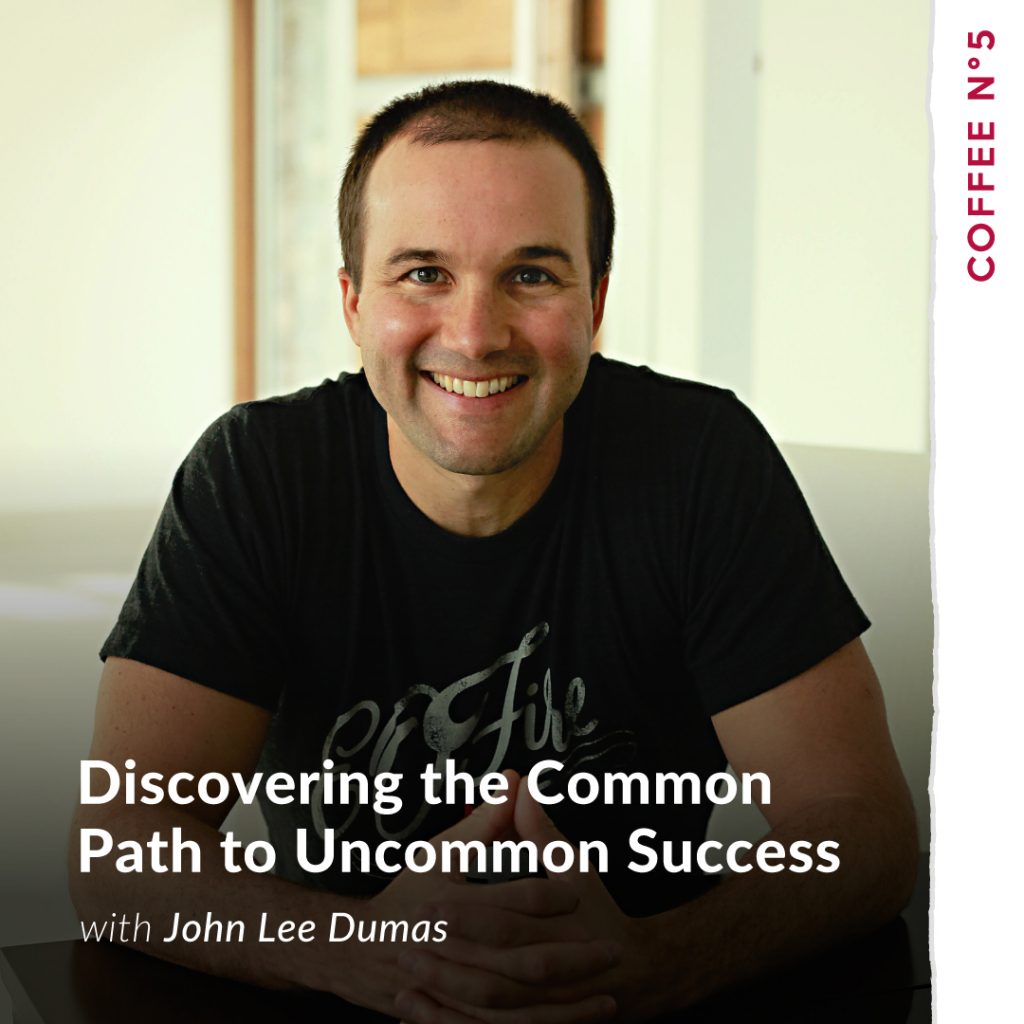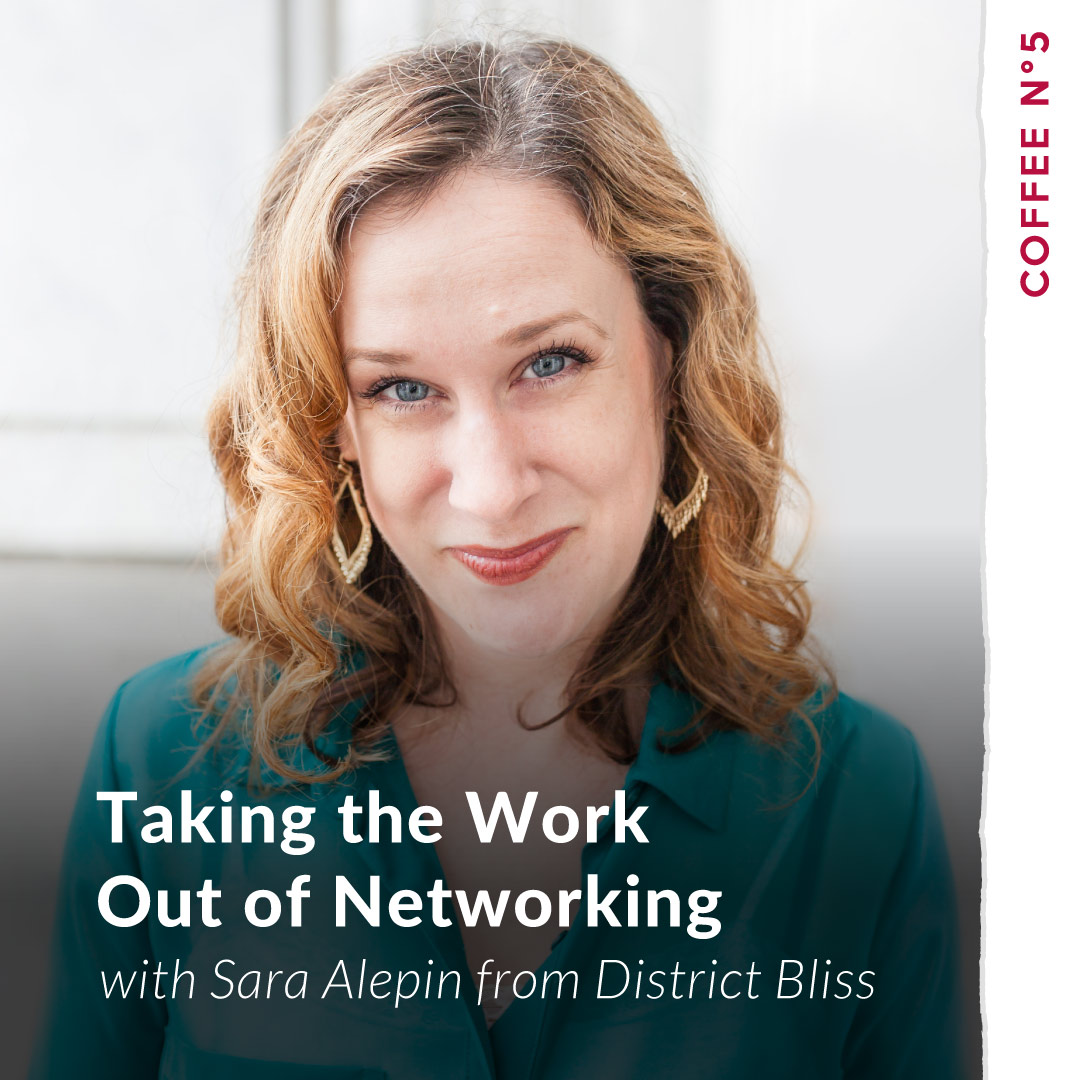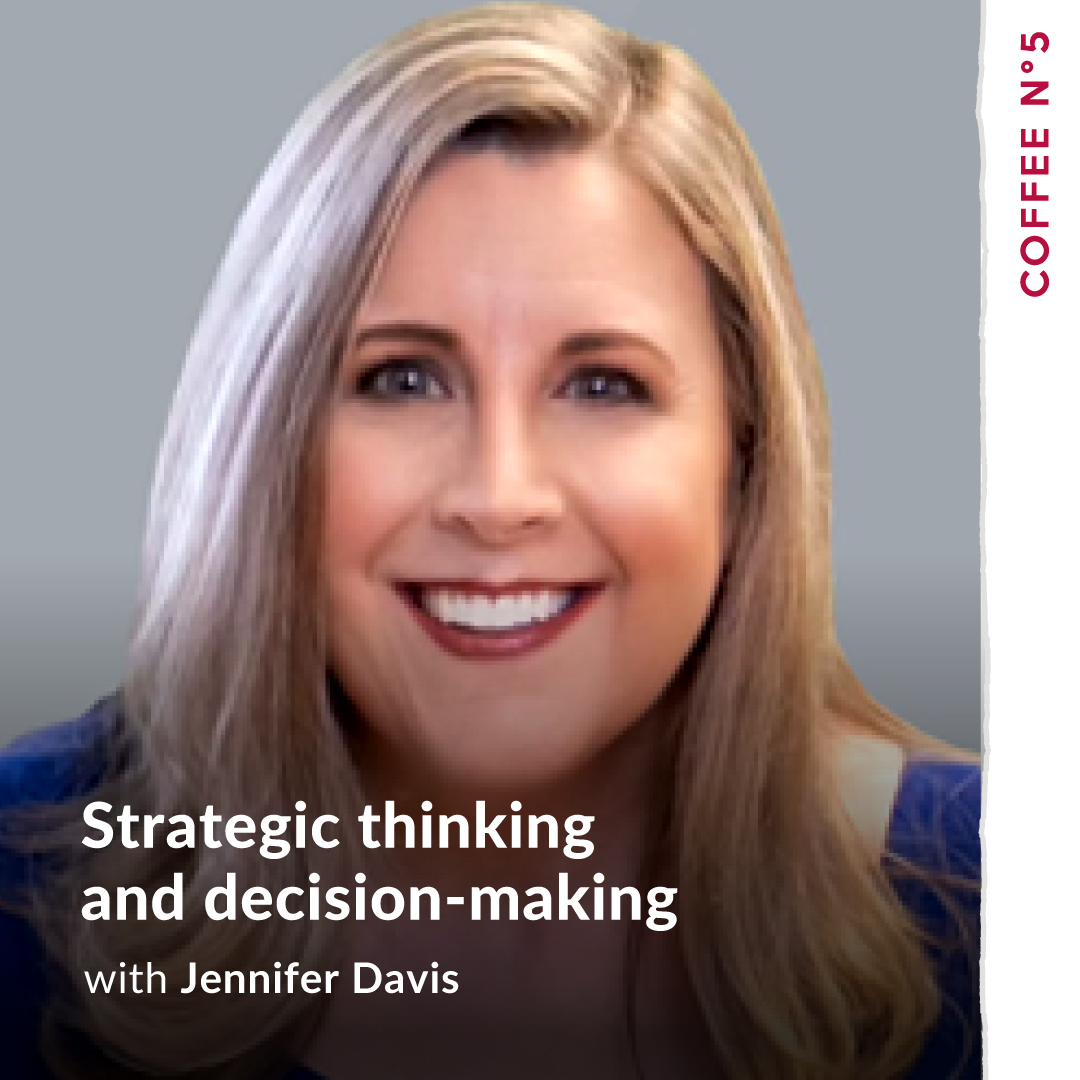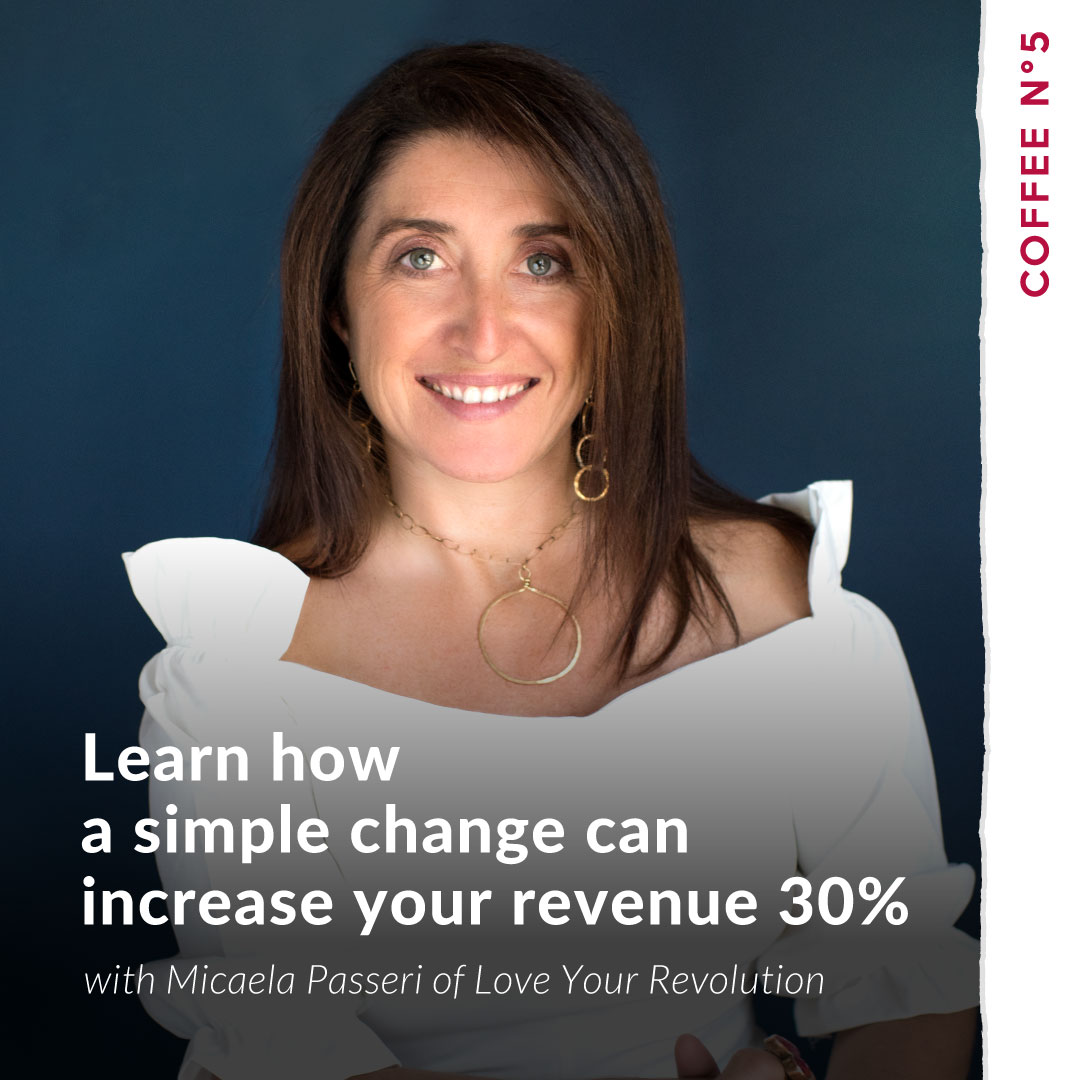Episode 64 – Coffee N.5 – Discovering the Common Path to Uncommon Success with John Lee Dumas
Lara Schmoisman 0:05
This is Coffee N.5 I’m your host, Laura Schmoisman. Hi everyone. Thank you so much for being back here in coffee N5 and today we are live on Facebook too. And you know, guys, I’m all about business, but also I’m about things that can happen in your life and you never know how they can happen as I mean like, right now I’m about to chat with John Lee Dumas if I say it correctly. And that he just confessed to me that even though he has a French Latin last name, his Spanish is not so good.
John Lee Dumas 0:48
My French is terrible as well.
Lara Schmoisman 0:50
Oh, right. Well, I didn’t test you and mine is horrible as well. So, John, tell us a little bit about us. I mean, I want to hear about the common path of uncommon success. I want to hear about your roadmap to financial freedom and fulfillment, I want to talk about all those things. But I want to know first, who are you? And how did you get here?
John Lee Dumas 1:17
Yeah, I’m just a boy from the state of Maine, which is a very small state. And, you know, I grew up in the country, you know, didn’t really have much in the way of city living and back when I was younger, but decided to join the army. So I spent eight years as an officer in the US Army, did a little bit of law school to some corporate finance and commercial real estate. So I just kind of bopped around Lara to a lot of different careers, a lot of different jobs. And you know, frankly, I was not really finding my way, which I think is pretty common for people in their 20s and early 30s. But then I decided it was time to surround myself with the right people by interviewing successful entrepreneurs so that I could learn from them. So I launched back in 2012, entrepreneurs on fire, which was the first daily podcast interviewing the world’s most successful entrepreneurs. And as you and I are talking now, I’ve interviewed over 3000s, of the world’s most successful entrepreneurs.
Lara Schmoisman 2:20
That’s incredible,
John Lee Dumas 2:21
Over 100 million total listens to the podcast to date. And as you mentioned, I took those 3000 interviews with successful entrepreneurs. And I put their genius into a book called The common path to uncommon success, which gives you a 17 step roadmap to financial freedom and fulfillment. So if you want financial freedom, if you want fulfillment, this book is a 17 step roadmap to get you there.
Lara Schmoisman 2:53
Oh, absolutely. I mean, I mean, I need it, I think everyone who wants to be an entrepreneur needs it. And I always believe and this is a personal belief, I was one of those girls who didn’t fit in any box. So for me, entrepreneurship was the only way to go. But also I had to have, I don’t believe that he just can go and be an entrepreneur, you have to have some experiences, and you have to have some failures. And you should also flirt with different things. Because as you said, you probably something, you learned something in the army, you learn something in law school,
John Lee Dumas 3:28
All of those things, because I was able to take both my successes and my failures in the first 32 years of my life, and apply them to my entrepreneurial venture with this podcast, entrepreneurs on fire. If I had launched the podcast back at 22 years old, with no life experience, it would have failed, like I had to put in the reps, I had to have failures and successes and struggles and obstacles and challenges to get to a place where I was able to launch a successful business. So you know, people that are struggling, that are, you know, scared, that are having difficulties doing different things. That’s part of your journey. That’s part of your roadmap, you need to have patience and consistency of adding value in this world, hopefully, on a topic that you’re passionate about.
Lara Schmoisman 4:18
Okay, I love to hear all the success stories, which is wonderful. And I believe that there is only one factor in any entrepreneur’s life that is unique. And is the only one factor that he cannot play with and his timing and is the timing in the society that you live in. And the moment that you are ready to launch, all the conditions need to be put in place. Everything needs to work together. And if the timing is correct, everything’s going to work.
John Lee Dumas 4:50
So I can tell you that, to me. Timing is another word for luck, and luck is where effort meets opportunity. So I definitely believe that. For me to launch entrepreneurs on fire in 2012 was really lucky, because the timing was perfect. The platform of podcasting was just getting ready to take off, nobody was really doing much with it or knew much about it. So I was super early, but super early on something that was about to explode. Now, I didn’t know it was going to explode. In hindsight, obviously, I see the trajectory of, you know, podcasting being a really big deal. But at the time, you don’t know. So Timing is everything, luck is everything. But again, luck is where effort meets opportunity. So you’ve got to be putting in the effort. So when the opportunity arises, you can jump on it.
Lara Schmoisman 5:47
And then you also have to put in the work. I mean, you cannot have a restaurant working if you don’t have a cook, if you don’t have the ingredients. You need to have all the parts working.
John Lee Dumas 5:59
That’s where the effort is. effort is work. Yeah. is waking up every day. And putting in the work.
Lara Schmoisman 6:05
Yeah, absolutely. I also want to talk because I love to hear the successful stories, which I’m sure that you hear 3000 times now. And what about the journeys? What about like, not, every journey was pretty, I’m sure. So, what are the most common challenges that you’ve seen in this road with entrepreneurs?
John Lee Dumas 6:33
So as you mentioned, I’ve done over 3000s interviews with successful entrepreneurs, the first 2000 interviews, I asked the same question to every one of my guests. What are your worst entrepreneurial moments, I made them tell the story of their biggest failure or their worst moments, I made them tell that story. Because there’s so much to be learned from that story. And I’ll tell you a very commonality of people when they struggle when they have obstacles, and they have challenges when they fail. It’s because they’re scared. It’s because they’re fearful. It’s because they dealt with themselves. Individuals who deal with themselves who are scared, who are fearful, they don’t take action, they freeze, they just sit there and they don’t move. Just like one of those animals in the wild. Like you see them they get spooked like a deer, they just freeze and they just stand there and they’re frozen. That can be a death note for an entrepreneur, you need to always be moving, always taking action, taking one failure after another failure, learning from every single one of them, and applying those lessons learned to the next step. So that’s why you always have to be getting up, putting in the work, doing the reps, honing your skills, and understanding that daily failure is part of the game.
Lara Schmoisman 8:02
Yeah, I mean, it’s I mean, you’re an entrepreneur, I’m an entrepreneur, I mean, I have a large team that I have working for me. And it’s not an easy life for entrepreneurs. its not nine to five, your mind is on your business all the time. And not only the money side of the business, also the human side of the business. So I believe that there are a lot of people that they forget when they want to start the business. Many people want to start a business and say, Oh, yeah, I’m gonna come up with this idea. Yeah, you need to have not only the money, you need to have the human capital, as well. What about the ego? Yes, yeah. Cuz I believe that a lot of entrepreneurs think that because they started a business. They’re an entrepreneur, or they invested money, it goes into their ego, and Ive seen how that is a failure by tough.
John Lee Dumas 8:56
And in those first 2000 interviews that I did, where I asked the question, what are your worst entrepreneurial moments? Oftentimes, the worst moments were right, when they thought they were the best. their ego was the highest, they thought they were untouchable. And then boom, they fell, you know, the mighty have fallen. So I will say that, absolutely. Ego is something you’ve got to always be careful of. I’m a big believer in humility, being humble. Always understanding that there’s a lot of things that can go wrong at any point in that you as the entrepreneur, always need to be learning is a critical aspect of it. Confidence is important. You need to have confidence otherwise, you know, what are you doing, but ego can be a very dangerous game to play.
Lara Schmoisman 9:44
Well, confidence is believing in what you do and knowing that you do it well. Otherwise, how can you sell if you don’t believe in yourself, and I always believe that an entrepreneur is also to be a risk management specialist. Because everything you’re doing you are assessing risks. Do I have the money to do this? Or do I invest in this? Or do I hire this person? Or do I not hire so you’re always assessing the pros and the cons or your business. And that’s something that you can never stop doing. And when you think that everything has calmed down and say, Okay, I need to reassess, because it’s just not normal that something is completely not news. Because the economy is not like that, either. So the economy is changing. So we need to be revisiting how we run our business all the time, and how we can improve.
John Lee Dumas 10:40
I like to say your finger always has to be on the pulse. Like you need to know what your customers are thinking, what your clients are thinking, what your team’s thinking, what people in your industry are thinking, what are your competitors thinking, your fingers gonna be on the pulse. Otherwise, everything’s gonna pass you by.
Lara Schmoisman 10:56
So do you think that you should have that idea that you mentioned before, in your initial idea, what are the steps that you will suggest to people after having that idea, what would they do next, to be a successful entrepreneur?
John Lee Dumas 11:16
So listen, to become a successful entrepreneur, it’s so much simpler than a lot of people think. It’s not easy. But it is simple. become the number one solution to a real problem that your audience has. Because Lara, people will be a path to the doorstep of the number one solution to their problem. And they will ignore the second best solution to infinity. Nobody wants the second best solution, nobody wants a second best, they want the best solution to their problem.Are you willing to identify the number one problem, and then create the number one solution in a specific niche in a tiny little part of any market that you want? If the answer is yes, you are going to find a version of success by providing that solution to an audience, whatever that might be. And so that may sound simple, because it is, but it is very difficult to execute. A million people came up with the idea of Uber, before Uber was created, one person executed, one person.
Lara Schmoisman 12:34
And there are some situations. for example, Coca Cola and Pepsi, that basically they sell this very similar product. But what did they do? Pepsi was created, they went after a different niche than Coca Cola. That’s something that you can always do if you have a similar product, but you go after a different niche. And you make sure that you are the solution for those specific people. And separate yourself from the competition. Do you believe that you can do everything by yourself? Or do you need a team to be successful?
John Lee Dumas 13:11
So I think there’s certain entrepreneurial ventures you can do by yourself. If they’re niche enough, if they’re small enough, you know, if you have, you know, a really specific vision, sure, you can do it by yourself. If you want to make a really big impact in this world, and really meaningfully impact a lot of people and lead a somewhat you know, normal balanced life, then you should be building a team, a team around you people that are great at doing things that you’re not great at doing. people that love doing things that you frankly don’t like to do, but have to be done as part of your business. Like I have an accountant, I have a lawyer, I have a graphic designer, I have a web development guy, I have a social media manager, I have a copywriter, all of those things I don’t want to do, and I’m not great at doing. I’m great at doing very specific things. And in my business, I do those things. And I let my team handle the rest.
Lara Schmoisman 14:08
Well, at the end of the day, your time is more. It’s worth more by doing what in the world, but trying to attempt to do other things.
John Lee Dumas 14:20
And speaking of time, I know our time’s running short, but I’ve really enjoyed chatting with you today.
Lara Schmoisman 14:26
Yeah, I am too. But before we go because we are running short, I want to ask you about the 17 steps that he can give us a really short version of those 17 steps so our audience can go and get the book and know what it’s a little bit about.
John Lee Dumas 14:44
So Listen. I’ll give you a quick version of the first three. Okay, one of the 17 step processes is to identify your big idea. Step two is to discover the niche within your big idea that is not being served and you can become the best solution to that. And then step three is to create your avatar, the single perfect customer, client consumer of your contents. That is step one, two, and three, of course, there’s 14 more steps. And the common path to uncommon success is the genius of the 3000 entrepreneurs I’ve interviewed over the past decade. So I truly hope you enjoy it.
Lara Schmoisman 15:25
Well, I definitely will check it out. But thank you so much, John, for being here. And coffee number five today, I really enjoy all your insights. And people will put all the notes of the podcast and we put the links and whatever John wants to. Do you have a final offer for us, John, something you want to join.
John Lee Dumas 15:47
Thanks for hanging out today. Coffee Number five. Thank you so much. Adios,
Lara Schmoisman 15:52
Adios.
It was so good to have you here today. See you next time. Catch you on the flip side. Ciao, ciao.







